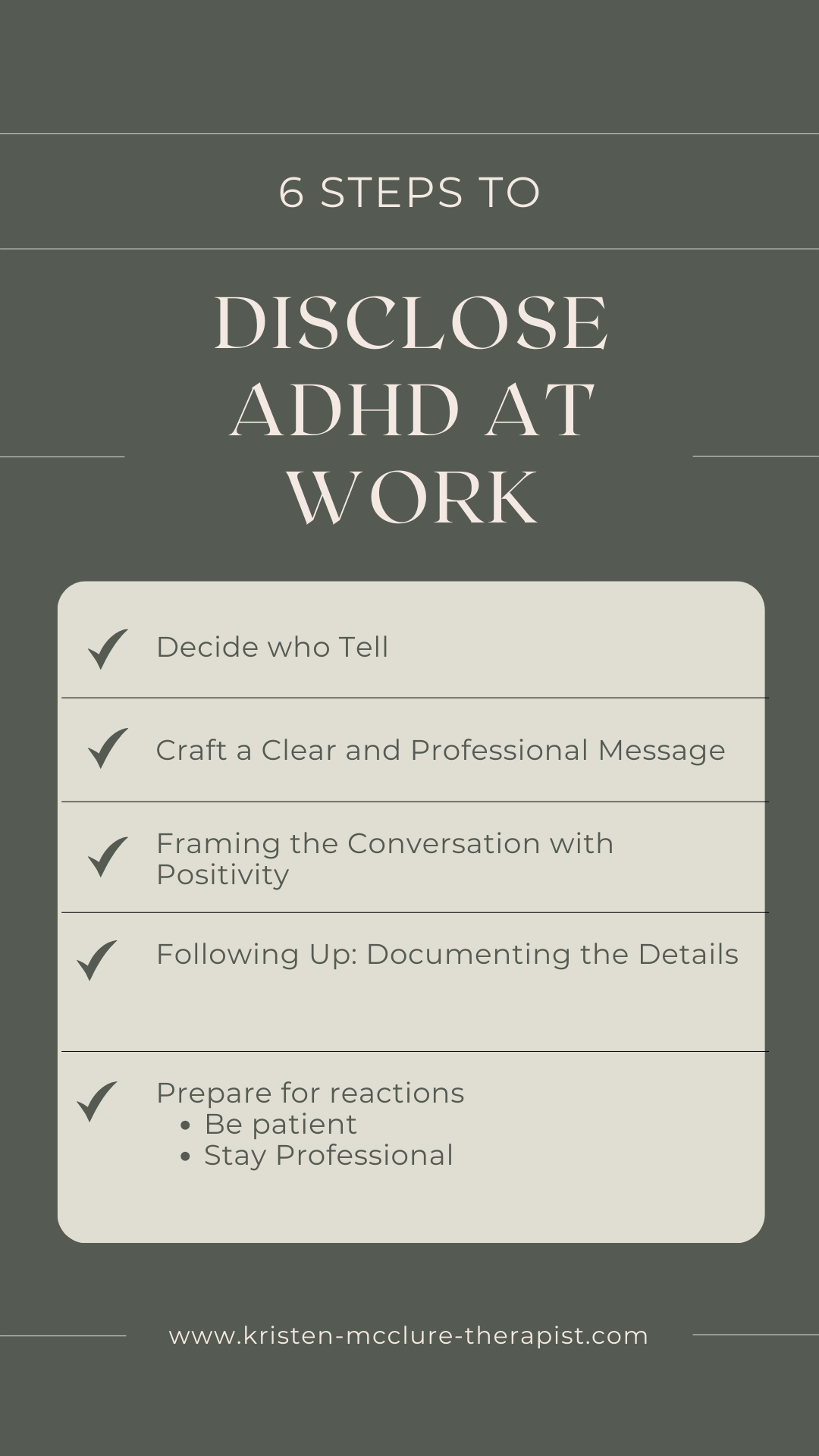How to disclose you have ADHD at Work
So, you’ve decided to disclose your ADHD at work. That’s a big decision—and it’s a deeply personal one. But how do you navigate the process? Sharing your diagnosis can open the door to accommodations and support, but it’s essential to approach the conversation thoughtfully.
Here’s how to disclose ADHD at work in a way that feels empowering and professional:
1. Decide Who to Tell
The first step is identifying the right person with whom to share your diagnosis. Should you talk to your boss, HR, or both?
- Your Manager: If you have a supportive boss who’s approachable and understanding, starting the conversation with them may help set the tone for a positive experience.
- HR Department: If you’re concerned about confidentiality or unsure how your boss might respond, HR can be a safe first point of contact. They’re trained to handle sensitive information and can often act as an intermediary to secure accommodations.
💡 Pro Tip: If your company has an Employee Assistance Program (EAP), consider contacting for guidance before disclosing.
2. Craft a Clear and Professional Message
Before you talk, spend some time planning what to say. Aim for clarity and professionalism while focusing on the accommodations you need rather than the challenges you face.
- Do Your Research: Familiarize yourself with your company’s policies on accommodations and anti-discrimination protections. Knowing your rights will give you confidence.
- List Your Needs: Be specific about what accommodations would help you thrive. For example, you might ask for flexible deadlines, noise-canceling headphones, or weekly check-ins with your manager.
Here’s an example script to get you started:
"I wanted to share something that will help me be more effective at work. I have ADHD, which sometimes affects my ability to manage [specific challenge]. With [specific accommodation], I feel confident I can continue delivering my best work."
3. Framing the Conversation with Positivity
When you disclose, keep the focus on solutions and collaboration. You’re not asking for special treatment; you’re advocating for the tools you need to succeed.
- Be Positive: Frame ADHD as a part of your unique skill set. For instance, you might highlight your creativity, problem-solving ability, or ability to hyperfocus on tasks you enjoy.
- Focus on Growth: Share how accommodations will help you achieve your goals and benefit the team.
4. Your Rights and Confidentiality: What to Know
If you disclose through HR, they are often required to keep your medical information private. This means your boss may only know about your needed accommodations, not your specific diagnosis.
For example, instead of saying, “I need extra time because of ADHD,” you might simply request “additional time for detailed tasks” without elaborating further.
💡 Pro Tip: If you’re in the U.S., review the Americans with Disabilities Act (ADA) for protections around workplace accommodations. Similar protections exist in other countries, like the Equality Act in the UK or Fair Work Act in Australia.
5. Following Up: Documenting the Detail
After your disclosure, follow up with an email summarizing what was discussed. This creates a paper trail in case there are misunderstandings or issues later.
For instance, you could write:
"Thank you for taking the time to discuss accommodations with me today. To summarize, we agreed on [specific accommodation]. Please let me know if there’s anything else I need to provide to move forward."
6. Know What to Expect After Disclosure
Reactions to disclosure can vary depending on your workplace culture. While many employers will be supportive, others might need time to adjust.
- Be Patient: Your boss might have questions or need to learn more about ADHD.
- Stay Professional: If the initial response isn’t ideal, stay calm and remind them of the benefits of accommodations for everyone involved.
Final Thoughts about How to Disclose ADHD at Work
Disclosing ADHD at work is a brave step toward advocating for yourself and your needs. By preparing and approaching the conversation confidently, you can set the stage for a more supportive and productive work environment.
Remember: You deserve to thrive at work—and accommodations are a tool to help make that happen.






